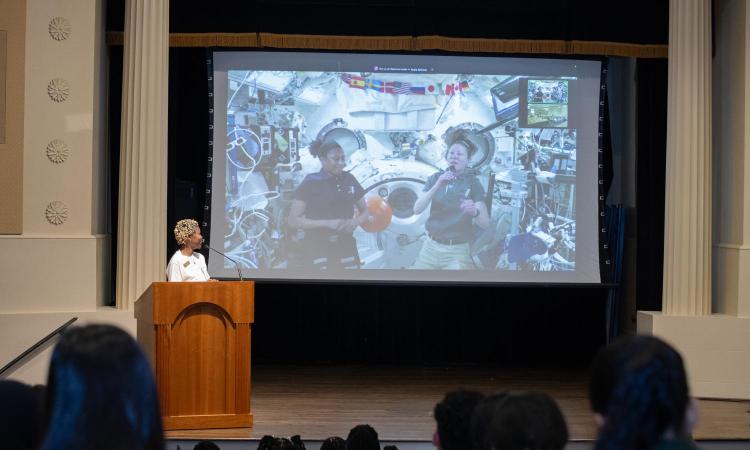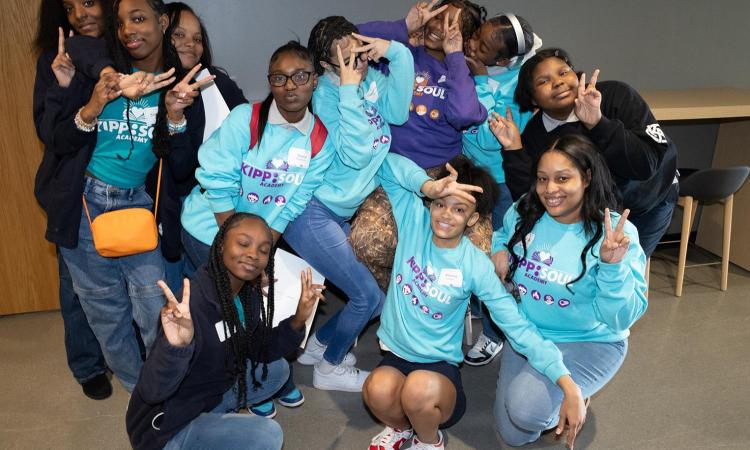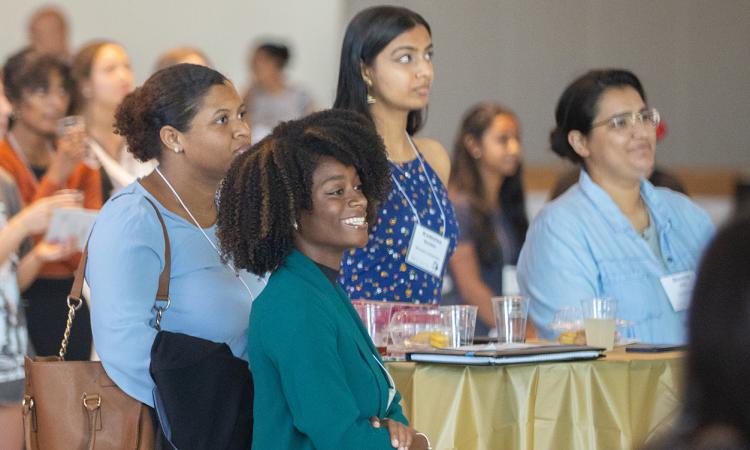After helping increase the number of women undergraduates in the College, WIE expands to grad students and postdocs to build on its thriving community.
(text and background only visible when logged in)
When Joy Harris arrived as the new director of the College’s Women in Engineering (WIE) program, there was a lot to celebrate.
In its 30 years of existence, the program has contributed to boosting the number of women in the College to 35% of undergraduates. And in some Schools, female students now outnumber males. WIE also has been awarding more than $150,000 in scholarships every year and hosting a robust program of corporate engagement opportunities for students.
That meant it was time for the next chapter, and Harris had some ideas.
“WIE is a women-led office that serves the entire College,” said Harris, who herself studied electrical and computer engineering at Tech as an undergrad. “Our vision is for 100% of the College of Engineering to be positively impacted by a WIE program or initiative. Men, women, faculty, staff, grads, postdocs, undergrads — 100% of the College.”
Pipeline to Community
WIE’s work starts with middle and high school students, who have opportunities to come to campus and learn about engineering and explore the field’s different disciplines. Harris and the WIE team have worked to expand those programs, opening the door to engineering majors and careers for more Georgia students.
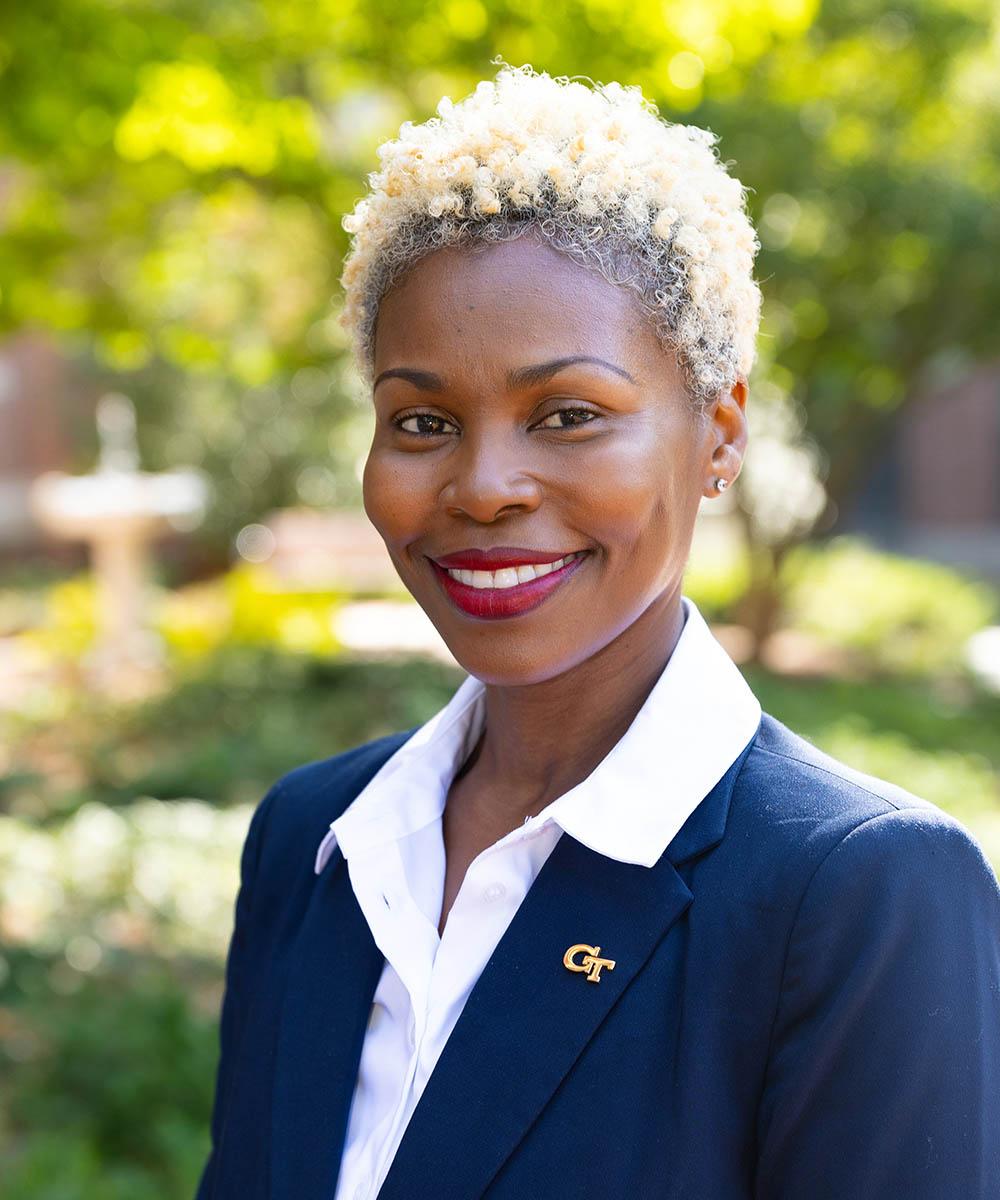
Joy Harris
Director, Women in Engineering
At the annual fall Engineering Career Conference, high school girls get to see first-hand what they can do with engineering skills and compare mechanical engineering to environmental and chemical engineering, for example. That event typically has hosted around 150 students.
In 2023, WIE welcomed 400 — essentially, every student who wanted to come was able to. And corporate support meant WIE could offer the program for free. That matters, Harris said, because cost is no longer a barrier. And attending that program has real impact on the pipeline of students who consider Georgia Tech.
“We just looked at the numbers, and 70% of our conference participants applied to Georgia Tech,” Harris said. “It’s working. We can’t control who actually comes to Tech, but we can get those applications in the pipeline. Seventy percent of 150 versus 70% of 400 is huge. That’s a big difference in terms of increasing our pipeline of qualified students who can be successful here.”
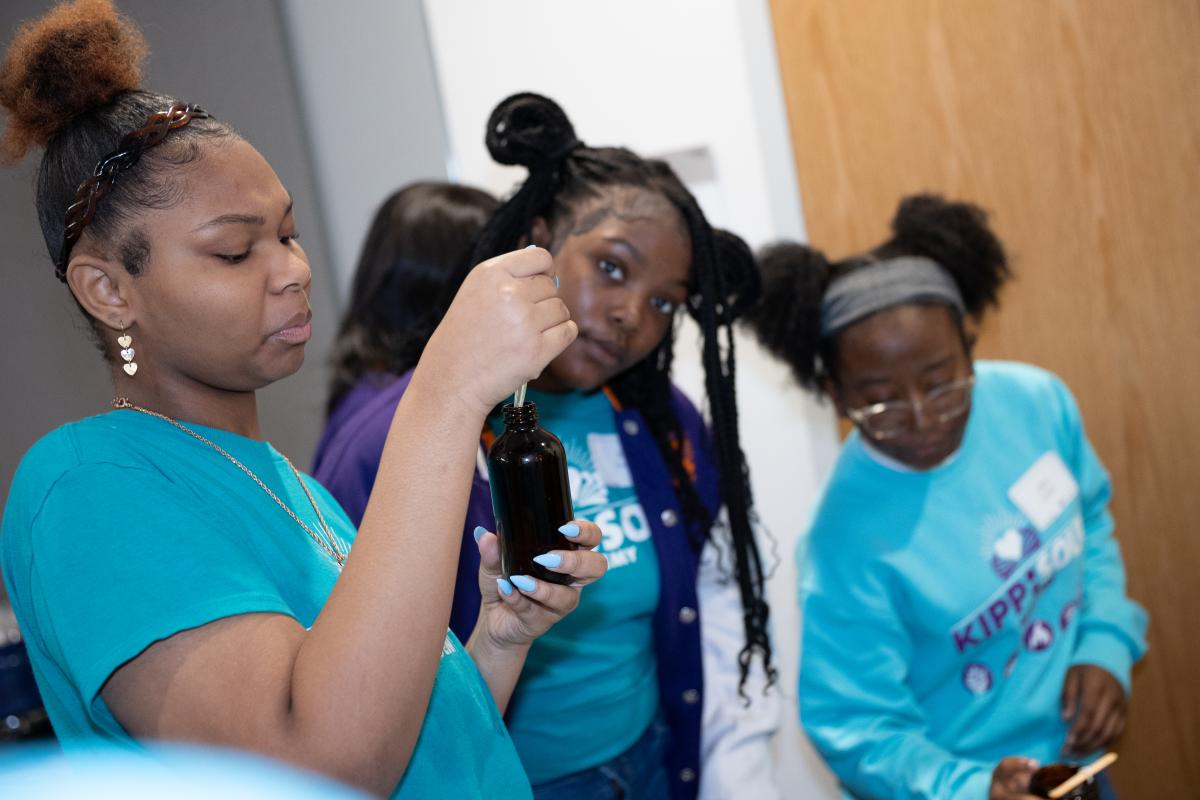
Participants worked with scented oils as they learned about materials science and engineering through candle-making, one of the five activities at the Students Exploring Engineering event.
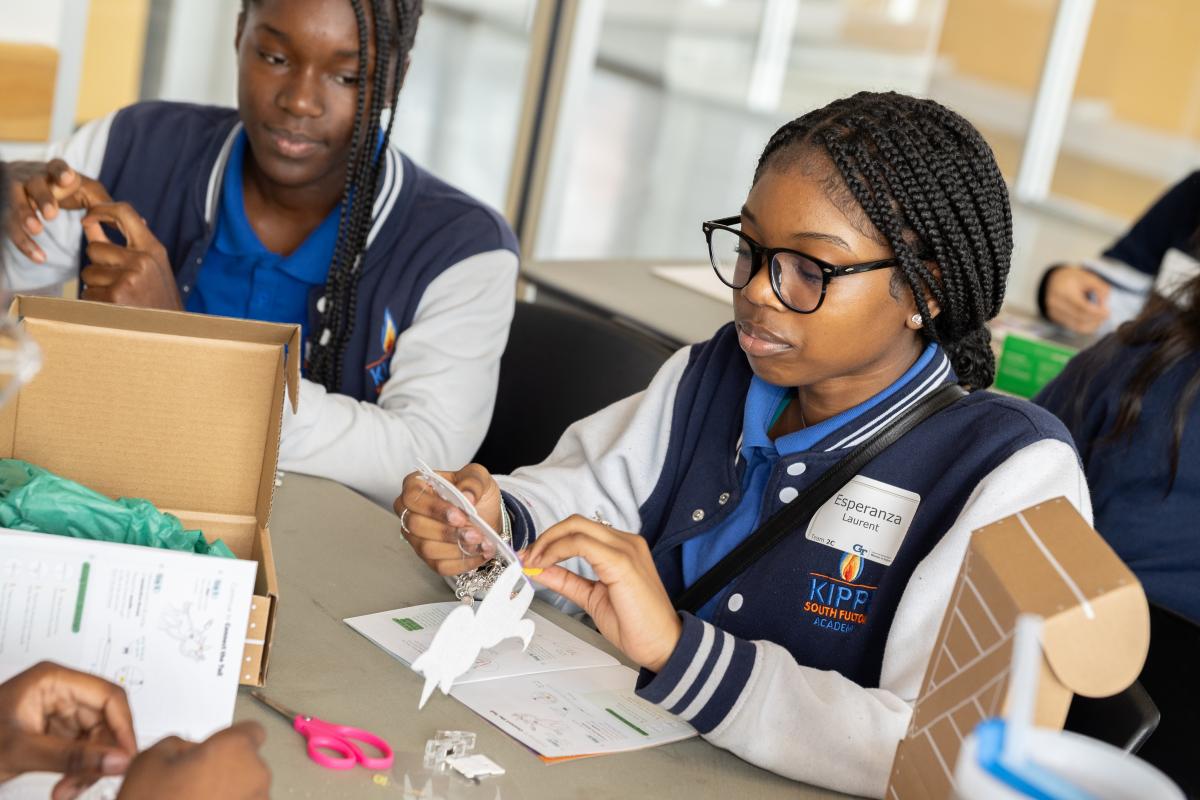
Middle school students work to build a light-up keychain at the event and learn about concepts in electrical engineering.
Meanwhile, WIE tripled the size of the Students Exploring Engineering event targeted to middle schoolers, growing from roughly 40 students to 140 this spring. And Harris said they’ve worked to cram more into those hours on campus, with students learning about five engineering disciplines instead of two or three.
The same kind of expansion mindset is driving increases in programs designed to support women once they arrive on campus as Georgia Tech students.
The undergraduate Mentors and Mentees program also tripled in size, serving 150 students this year. WIE staff have been working to drive attendance at their corporate and professional development workshops, being more intentional about spreading the word to current students and seeing dozens more attend as a result.
Grad Students and Postdocs Welcome
In the fall, WIE piloted a new initiative specifically for graduate students, a group the program hadn’t targeted directly before. The Graduate Women’s Leadership Development Program offered executive coaching and structured learning for 30 students — covering everything from lab management to building a successful career.
Ph.D. student Yulizza Henao-Barragan joined the group to build her leadership skills so she can be an effective faculty member and contribute to her community once she finishes her degree. She said the tools and techniques she received from leadership coach and trainer Angelique Adams inspired her.
“I’m learning how to become a better role model, and this experience taught me how to know myself to improve my skills both at work and in my personal life,” said Henao-Barragan, who studies with Russell Gentry in the School of Civil and Environmental Engineering. “Dr. Angelique’s methods and step-by-step explanations are so clear that I now feel empowered to pursue a better version of myself.”
Henao-Barragan is five years into her doctoral studies, but for grad students just getting started, the program also added in a mentoring circle led by Sandia National Labs.
“One of the challenges brought to my attention was retention amongst early grad students,” Harris said. “We built this program to give them the skills they need to persist in their studies and overcome initial barriers in their first couple of years of graduate study.”
WIE has developed a similar pilot program offering coaching and resources for postdoctoral fellows in partnership with the Office of Graduate and Postdoctoral Education.
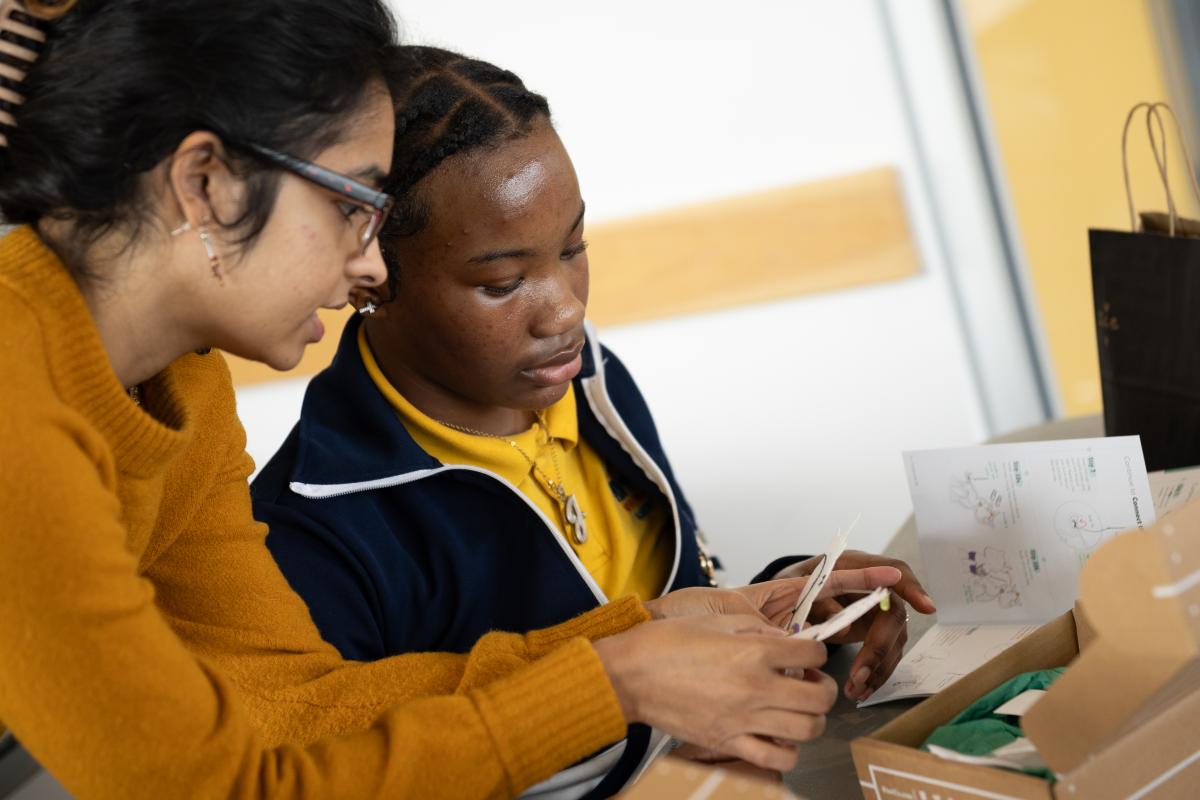
A WIE volunteer explains a keychain wiring exercise to a middle school student at Students Exploring Engineering.
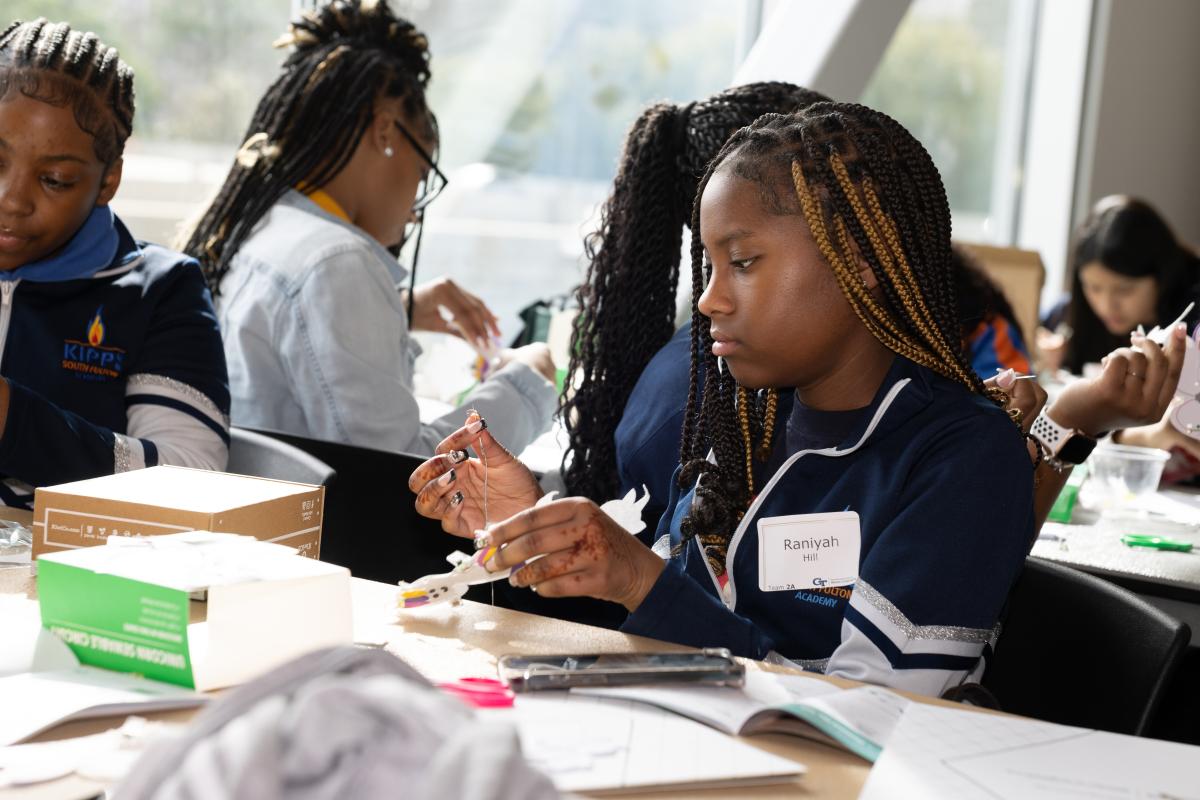
Students from several Atlanta-area middle schools participated in activities at the Students Exploring Engineering event designed to expose them to five different engineering disciplines.
(text and background only visible when logged in)
Many Partners, More Impact
Harris is in the somewhat unique position of splitting time between the College of Engineering Dean’s Office and the Office of Undergraduate Education, where she also serves as director of undergraduate transformative learning initiatives.
Maybe that makes her naturally prone to finding linkages and partners to amplify WIE’s work.
One of those initiatives is offering scholarships to undergraduates to pay for graduate school entrance tests like the Graduate Record Examination (GRE) and the Medical College Admission Test (MCAT) that can cost several hundred dollars. It’s a collaboration with the Pre-Graduate and Pre-Professional Advising office, which works with students to prepare their grad or med school applications. And it’s open to engineering students of any gender.
Another effort offers transfer students a dedicated living-learning community (LLC), akin to the LLCs first-year students can join. Transfer students can participate in existing LLC programs, but the experience is different because they’re joining a community that’s already been together for a year or more, Harris said.
“This is a unique offering, and we’re able to work with a high-priority population — underrepresented minority students, students from families with lower income, and first-generation college students — who need a special set of resources,” she said.
This is a unique offering, and we’re able to work with a high-priority population — underrepresented minority students, students from families with lower income, and first-generation college students — who need a special set of resources.
JOY HARRIS
Director, Women in Engineering
Working with the College’s Center for Engineering Education and Diversity and the Georgia Tech Office of Minority Educational Development, the pilot this year in Harris Hall includes 88 residents. Next year, Harris said, they hope to expand the Transfer Student Experience Program to all students in those groups, with a small subset living on campus.
Lead ‘Where We Are’
Six months into her new role as WIE director, Harris said there’s more on her agenda, but she’s excited about the seeds the WIE team already has planted.
“We’re focusing on providing leadership opportunities for our women to serve everyone. That’s important because it continues to build community among women in the College. We are still a minority,” Harris said.
“Georgia Tech’s motto is Progress and Service. If we’re going to build engineers who are in progress and service of their fields, and if we’re going to be leaders in our fields, we need to be leaders where we are.”
(text and background only visible when logged in)
(text and background only visible when logged in)
Related Content
Celebrating Women in Aerospace Engineering
Call with women astronauts in space, industry panel, Marilyn Smith celebration highlight a day honoring the journey of women in AE.
Students Exploring Engineering
At the Students Exploring Engineering event, Atlanta-area middle school students participants in a variety of activities designed to expose them to concepts in five engineering disciplines. Participants worked with faculty members and Georgia Tech students to make candles, wire light-up keychains, and more.
Women in Engineering
The Georgia Tech Women in Engineering (WIE) program is dedicated to recruiting top students into engineering majors and, once enrolled, assisting them to achieve their fullest potential as engineers and leaders. While WIE programs are designed for women, their implementation is inclusive of all students, and driven by the belief that WIE’s success is a natural result of efforts to improve the overall climate for all students. Since 2009, Georgia Tech graduates more women engineers than any other institution in the United States.
(text and background only visible when logged in)
